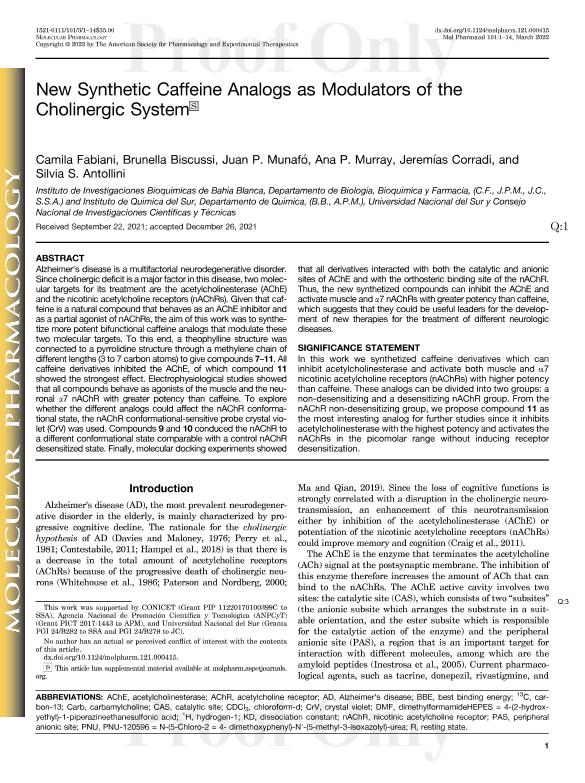Artículo
New Synthetic Caffeine Analogs as Modulators of the Cholinergic System
Fabiani, Camila ; Biscussi, Brunella
; Biscussi, Brunella ; Munafó, Juan Pablo
; Munafó, Juan Pablo ; Murray, Ana Paula
; Murray, Ana Paula ; Corradi, Jeremias
; Corradi, Jeremias ; Antollini, Silvia Susana
; Antollini, Silvia Susana
 ; Biscussi, Brunella
; Biscussi, Brunella ; Munafó, Juan Pablo
; Munafó, Juan Pablo ; Murray, Ana Paula
; Murray, Ana Paula ; Corradi, Jeremias
; Corradi, Jeremias ; Antollini, Silvia Susana
; Antollini, Silvia Susana
Fecha de publicación:
03/2022
Editorial:
American Society for Pharmacology and Experimental Therapeutics
Revista:
Molecular Pharmacology
ISSN:
0026-895X
Idioma:
Inglés
Tipo de recurso:
Artículo publicado
Clasificación temática:
Resumen
Alzheimer´s disease is a multifactorial neurodegenerative disorder. Since cholinergic deficit is amajor factor in this disease, twomolecular targets for its treatment are the acetylcholinesterase (AChE) and the nicotinic acetylcholine receptors (nAChRs). Given that caffeine is a natural compound that behaves as an AChE inhibitor and as a partial agonist of nAChRs, the aim of this work was to synthetize more potent bifunctional caffeine analogs that modulate these two molecular targets. To this end, a theophylline structure was connected to a pyrrolidine structure through a methylene chain of different lengths (3 to 7 carbon atoms) to give compounds 7-11. All caffeine derivatives inhibited the AChE, of which compound 11 showed the strongest effect. Electrophysiological studies showed that all compounds behave as agonists of the muscle and the neuronal a7 nAChR with greater potency than caffeine. To explore whether the different analogs could affect the nAChR conformational state, the nAChR conformational-sensitive probe crystal violet (CrV) was used. Compounds 9 and 10 conduced the nAChR to a different conformational state comparable with a control nAChR desensitized state. Finally, molecular docking experiments showed that all derivatives interacted with both the catalytic and anionic sites of AChE and with the orthosteric binding site of the nAChR. Thus, the new synthetized compounds can inhibit the AChE and activatemuscle and a7 nAChRs with greater potency than caffeine, which suggests that they could be useful leaders for the development of new therapies for the treatment of different neurologic diseases.
Palabras clave:
CAFFEINE
,
NICOTINIC RECEPTORS
,
MODULATION
,
ACETYLCHOLINESTERASE
Archivos asociados
Licencia
Identificadores
Colecciones
Articulos(INIBIBB)
Articulos de INST.DE INVEST.BIOQUIMICAS BAHIA BLANCA (I)
Articulos de INST.DE INVEST.BIOQUIMICAS BAHIA BLANCA (I)
Articulos(INQUISUR)
Articulos de INST.DE QUIMICA DEL SUR
Articulos de INST.DE QUIMICA DEL SUR
Citación
Fabiani, Camila; Biscussi, Brunella; Munafó, Juan Pablo; Murray, Ana Paula; Corradi, Jeremias; et al.; New Synthetic Caffeine Analogs as Modulators of the Cholinergic System; American Society for Pharmacology and Experimental Therapeutics; Molecular Pharmacology; 101; 3; 3-2022; 154-167
Compartir
Altmétricas



